China’s Foreign Minister Wang Yi Visits Eritrea, Kenya & Comoros: Report & Analysis
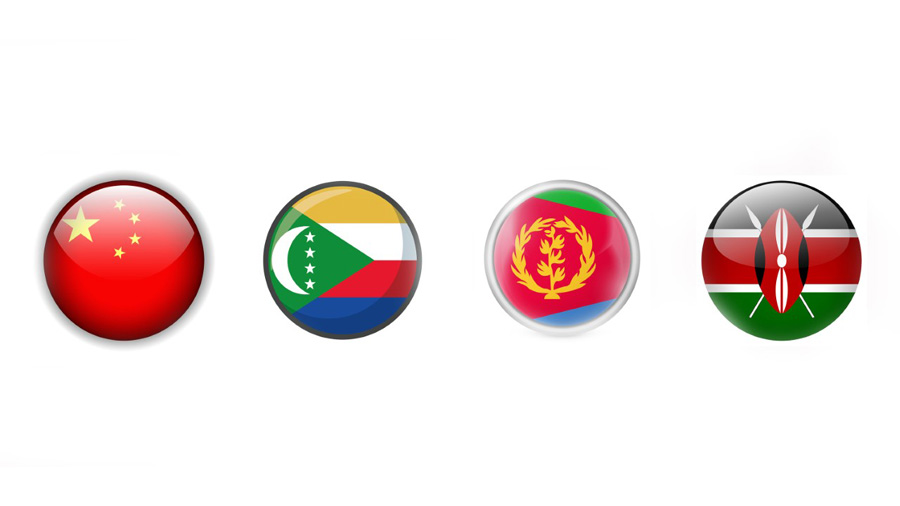
China’s Foreign Minister Wang Yi has been on his traditional New Year visit to Africa, just one year after Africa united as a Free Trade Area under the African Continental Free Trade Agreement (AfCFTA) which permits the duty-free sourcing and combining of African manufactured components and products into a finished item for both resale on the AfCFTA markets or for re-export. This gives significant opportunities to access other markets and combine with other manufacturers, such as with Renault, a dominant player in North Africa.
The tour marks the custom that the Chinese foreign minister’s first overseas trip of the new year is always to Africa, a tradition that is now in its 32nd year. It also comes less than five weeks after Wang’s last trip to the continent, when he led the Forum on China-Africa Cooperation conference in Senegal and also made a quick stop in Ethiopia.
Wang set out his Africa tour objectives as follows:
“First, to work with Africa to defeat the pandemic. The world is facing a new round of impact of the Omicron strain. As a friend of Africa, China will never sit by. President Xi Jinping has announced that China will provide another 1 billion doses of vaccines to Africa, and this largest-scale assistance plan to Africa is in progress. Batches of vaccines are being transported across mountains and seas and delivered to every corner of Africa where there is in need. Today, we have announced an additional 10 million doses of vaccines for Kenya. We will absolutely stand by our African brothers and sisters until the final victory is won.
Second, speed up the implementation of the outcomes of the Forum on China-Africa Cooperation (FOCAC). Over a month ago, the Eighth Ministerial Conference of the FOCAC was successfully held. President Xi Jinping announced the “nine programs” for China-Africa practical cooperation. A series of bilateral cooperation documents signed by China and Kenya today are the early harvest of the “nine programs” in Kenya. We stand ready to enhance synergy with African partners, roll up our sleeves and work hard to deliver all the outcomes of the conference to the benefit of the African people, help Africa speed up post-pandemic recovery and embark on the path of independent and sustainable development at an early date. The so-called “debt trap” in Africa is not a fact, but a malicious hype-up. It is an “utterance trap” created by those external forces that do not want to see Africa accelerate development. If there is any “trap” in Africa, it is the “poverty trap” and the “underdevelopment trap”. China is willing to work with all friendly countries to help African countries speed up post-pandemic recovery, eliminate poverty and underdevelopment, catch up with the times as soon as possible, achieve common development and create a better future.
Third, firmly uphold the common interests of China and Africa. In the face of power politics, hegemony and bullying and unilateral acts, China and Africa have the responsibility to jointly practice true multilateralism and safeguard international fairness and justice. China is ready to strengthen coordination and cooperation with Africa in international and regional affairs, safeguard the international system with the United Nations at its core and basic norms governing international relations, safeguard the legitimate interests of developing countries and push the development of the international order towards a more just and reasonable direction.”
We discuss his meetings as follows:

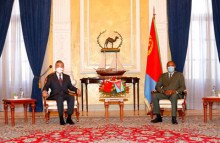
Eritrean President Isaias Afwerki Meets with Wang Yi
On January 5, 2022, Eritrean President Isaias Afwerki met in Asmara with Foreign Minister Wang Yi.
Background: The war in Ethiopia will undoubtedly have topped the agenda in Wang’s talks with his counterpart Osman Saleh Mohammed. China and Eritrea are aligned in their support of Prime Minister Abiy Ahmed in his fight against Tigrayan forces. The choice of going to Eritrea was also likely influenced by Beijing’s steadily growing popularity and influence throughout the entire Horn of Africa region. Eritrea is one of the most recent members of the BRI having signed off an MoU in November. They may later announce Belt & Road projects in response to Asmara joining the BRI. China often rewards new BRI members with loans or infrastructure development projects.
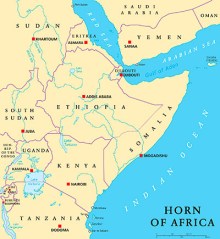
Isaias stated that strengthening a partnership with China is crucial to Africa’s realization of development, and cooperation with China by joint efforts is of great significance to the 1.3 billion people on the African continent. He expects China to play a greater role in supporting Africa’s development. Isaias said, Eritrea and China enjoy a solid foundation of friendship rooted in the principles and concepts of mutual respect and non-interference. Eritrea always firmly supports China in safeguarding sovereignty and independence, and respects China’s legitimate position.
Eritrea has drawn up a roadmap for cooperation with China and looks forward to learning from China’s development experience to conduct more dynamic cooperation, especially deepening cooperation in the areas such as infrastructure, mineral resources, agriculture, and human resources.
Wang Yi introduced the milestone significance of the sixth plenary session of the 19th CPC Central Committee, the important resolutions adopted and ten aspects of the historical experience. Wang stressed that the moves are of decisive significance for China to realize national rejuvenation. He said that China stands ready to step up exchanges of governance experience with Eritrea for mutual learning and common development.
The decision of the two heads of state to elevate China-Eritrea relations to a strategic partnership has opened broader prospects for bilateral cooperation. China stands ready to take this as an opportunity to implement the important consensus reached and push bilateral cooperation across the board to a new level. China will firmly support Eritrea in safeguarding sovereignty, independence, and national dignity, opposing external interference and unilateral sanctions, and exploring a development path suited to its national conditions and supported by its people. China is ready to work with Eritrea to turn the traditional political friendship between the two countries into a driving force for economic cooperation, turn Eritrea’s rich natural resources into its development advantage, and help Eritrea enhance its capacity for independent development and speed up its industrialization process. China encourages competent Chinese enterprises to take an active part in Eritrea’s development and construction.
The two sides exchanged views on the situation in the Horn of Africa. Isaias said, Eritrea firmly opposes the creation of social divisions and ethnic conflicts in the region by external forces. The key to resolving conflicts in Africa is to ensure that countries in the region can retain independence, unity, and cooperation and that they can jointly commit themselves to stability and economic development, thus creating favorable conditions for regional peace and development. Isaias expected China to play a bigger role in Africa’s peace and development process.
Wang said that in recent years, some major countries outside the region have used the Horn of Africa as an arena for geopolitical games, causing turbulence and frequent conflicts, seriously undermining regional peace and stability, and slowing regional development and revitalization. Under the current circumstances, countries in the Horn of Africa need to seriously discuss how to realize regional peace and security, unleash development potential and enhance governance capacity. In this process, China, as a sincere friend and reliable partner of countries in the Horn of Africa, stands ready to play a constructive role in this regard. The two sides also agreed to work together to implement the outcomes of the Eighth Ministerial Conference of the Forum on China-Africa Cooperation and boost China-Eritrea practical cooperation in various fields.
On the same day, Wang Yi held talks with Eritrean Foreign Minister Osman Saleh Mohammed, and signed the Joint Statement by Foreign Ministers of China and Eritrea. After this meeting, Wang announced that China would provide 100 million yuan (US$15.7 million) as additional support for Eritrea as the Horn of Africa nation welcomed China to invest in its mining, infrastructure and Massawa and Assab port developments. Wang also pledged financial support for Eritrea, a recent recruit to China’s infrastructure investment strategy the Belt and Road Initiative. He then condemned the US and some European countries for imposing sanctions over involvement in the Ethiopian conflict.
The top exports of China to Eritrea in 2019 were Laboratory Ceramic Ware (US$307k), Laboratory Reagents (US$183k), Rubber Tires (US$168k), Excavation Machinery (US$156k), and Transmissions (US$130k). The top imports of China from Eritrea were Copper Ore (US$44.5 million), Zinc Ore (US$12.4 million), Blood, antisera, vaccines, toxins, and cultures (US$923k), and unspecified Commodities (US$723k).
See also: Eritrea Joins The Belt And Road Initiative

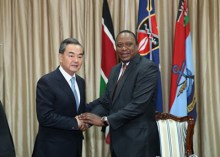
Kenyan President Uhuru Kenyatta Meets with Wang Yi
On January 6, 2022, Kenyan President Uhuru Kenyatta met with Foreign Minister Wang Yi.
Background: Ethiopia will have been a point of discussion in talks with Cabinet Secretary of Foreign Affairs Raychelle Omamo but not a very prominent one – Wang will have wanted to avoid any comparisons with U.S. Secretary of State Antony Blinken, who leaned heavily on Omamo regarding the Ethiopia war. Debt relief will have been a more pressing concern for Kenya, with attempts to get the China Exim Bank to ease up on costly loan servicing obligations as BRI projects have not yet produced revenues due to Covid issues.
Kenyatta said China is not only a sincere friend of Kenya, but also a development partner of close cooperation. The deepening pragmatic cooperation in various fields and cultural exchanges between Kenya and China has created many jobs in Kenya, improved people’s lives, and brought notable benefits to the people. Kenya would not have today’s development achievements without China’s strong support, which is imprinted on the mind of the Kenyan government and people.
Kenyatta said, every country has the right to independently choose a development path suited to its own national conditions, and bring health, prosperity, and dignity to its people. However, there are always some people who like to point fingers at our country, saying that we have various problems, but China has sincerely helped Kenya solve problems and meet our needs with actions. The cooperation between Kenya and China is about timely support between true partners. I was often asked why Kenya and China cooperate so closely. I told them that because China and Kenya respect each other and treat each other as equals. Kenya is willing to continue deepening mutually beneficial cooperation with China to achieve common development, and we are full of expectations for the future of Kenya-China relations.
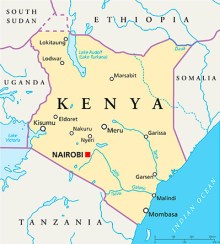
Wang said that the Chinese Foreign Minister’s visit to Africa at the beginning of each year is to demonstrate the solidarity and mutual trust between China and Africa and China’s firm determination to promote China-Africa friendship. This visit will send three clear signals. First, China will stand firmly with Africa to fight the COVID-19 pandemic with solidarity until the virus is completely defeated. Second, China is willing to strengthen all-round cooperation with Kenya to help Kenya enhance its self-development capabilities and accelerate industrialization. Third, China is willing to strengthen solidarity and coordination with Kenya in international and multilateral affairs, jointly safeguard the legitimate rights and interests of the two countries and the common interests of developing countries and safeguard international fairness and justice. China is willing to work with Kenya to implement China-Kenya comprehensive strategic and cooperative partnership, and to be partners that firmly support each other, accelerate development and revitalization, promote China-Africa solidarity, and safeguard regional peace.
Kenyatta said, Kenya and China share common or similar positions on international and regional issues. Kenya is willing to strengthen cooperation with China in multilateral settings, especially at the UN Security Council, to jointly promote a more just and reasonable international order.
Wang introduced the “Initiative of Peaceful Development in the Horn of Africa” proposed by China upon request. Kenyatta said, this initiative meets the urgent needs of countries in the Horn of Africa. Kenya agrees with it completely and is willing to play a role in this regard.
After the talks, Wang was invited to attend the completion ceremony of the Chinese-built oil terminal at the port of Mombasa with Kenyatta. Wang also held talks with Kenyan Cabinet Secretary for Foreign Affairs Raychelle Awuor Omamo, and jointly witnessed the signing of bilateral cooperation documents.
During his meetings with Omamo, Wang stated that “Kenya is China’s comprehensive strategic and cooperative partner in Africa and an exemplary country for showcasing China-Africa cooperation on Belt and Road Initiative. Under the strategic guidance of the two heads of state, China-Kenya relations have become a model of China-Africa solidarity, cooperation, and common development. Cabinet Secretary for Foreign Affairs Omamo and I have reached the consensus that under the framework of the comprehensive strategic and cooperative partnership between China and Kenya, both sides will strengthen and expand partnership in four aspects:
First, we need to be partners that firmly support each other. We will unswervingly support each other in safeguarding national sovereignty and territorial integrity, safeguarding our legitimate rights and interests, and exploring development paths suited to our national conditions.
Second, we need to be partners in accelerating development and revitalization. We will continue to strengthen cooperation in infrastructure development, trade and investment, and support Kenya in accelerating industrialization and modernization.
Third, we need to be partners in promoting China-Africa solidarity. We will work together to implement the outcomes of the Eighth Ministerial Conference of the Forum on China-Africa Cooperation, continue to promote overall cooperation between China and Africa, and jointly build a China-Africa community with a shared future in the new era.
Fourth, we need to be partners in safeguarding regional peace. We will maintain close communication on regional situation and hotspot issues, strengthen coordination and cooperation at the UN Security Council and other platforms, and play a greater role in promoting regional peace and stability.”
Following the talks, the two sides witnessed the signing of cooperation documents on digital economy, investment, agriculture, and the export of Kenyan agricultural products to China.
Kenya has been a net importer from China with imports and exports reaching US$3.6 billion and US$150 million, respectively, in 2019.
About 40% of imports from China in the past five years to 2019 are comprised of electrical and mechanical machineries, nuclear reactors and boilers while 60% of exports to China are of titanium and zirconium ores and concentrates.
Kenya may boost efforts to increase exports of tea, flowers and plants, leather products, coffee, macadamia, pineapples and oil seeds– products for which demand is increasing in China, and efficiency is increasing in Kenya.
Kenyan exporters to China face challenges including higher tariffs compared to China’s preferential treatment to least developed African countries; limited direct flights to China for flowers; marketing tea in Mandarin; and compliance with phytosanitary controls for avocados.
To boost exports to China, Kenya should continue its engagements with China to address trade bottlenecks; support micro, small and medium-sized enterprises in horticulture, tea, fruit, and vegetable value chains; and support the development of standards appropriate to the Chinese market.
See also: Eight African Belt And Road Initiative Projects That Global Investors Should Be Aware Of

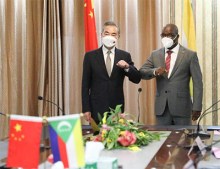
Wang Yi with Comorian Foreign Minister Dhoihir Dhoulkamal
On January 6, 2022, Foreign Minister Wang Yi held talks with Comorian Foreign Minister Dhoihir Dhoulkamal in Moroni. The Comoros islands are off the east coast of Mozambique and the coast of Madagascar on the Indian Ocean.
Background: China increasingly views the Indian Ocean as among its most strategically vital maritime interests, especially with the opening of new overland trade routes through to Southeast Asia, reducing shipping times by weeks and decreasing China’s shipping vulnerability to the Malacca Straits.
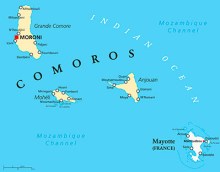
Wang Yi said, “Comoros is the “Country of the Moon” in the Indian Ocean, reiterating that China was the first country to recognize the independence of Comoros and establish diplomatic relations with the country. Over the past 47 years since the establishment of diplomatic relations, China and Comoros have always been sincere and friendly to each other, setting a good example of treating each other as equals and win-win cooperation between large and small countries. The fact that Chinese Foreign Minister has made Comoros an important stop of his first visit at the beginning of the year reflects the great importance China attaches to the China-Comoros relations. I hope that the visit will deepen mutually beneficial cooperation between the two countries in various fields and inject new impetus for the sound and steady development of bilateral relations.”
Dhoulkamal said, “The friendship between Comoros and China is long-lasting and strong. Marked by deep political mutual trust, win-win economic cooperation and mutual support in the international arena, the two countries have carried out exemplary cooperation. I sincerely thank China for its help and support for the development of Comoros and stand ready to work with China to promote the cooperation between the two countries in various fields to a new level continuously.
China’s effective management and control of the COVID-19 pandemic has fully demonstrated good governance. Meanwhile, China’s strong support for the global fight against the pandemic has demonstrated its sense of responsibility as a major country. African countries were greatly heartened by China-proposed cooperation initiatives with Africa announced at the Eighth Ministerial Conference of the Forum on China-Africa Cooperation (FOCAC). The forum has provided a good platform for both sides to deepen the partnership and strategic cooperation and has helped to advance the “Emerging Comoros Plan for 2030″ strategy. The Comorian side stands ready to work with China to strengthen Africa-China solidarity and jointly address global challenges such as pandemic and climate change, to achieve common development.”
Wang stated China firmly supports Comoros in safeguarding sovereignty, independence, territorial integrity, and national dignity, and in exploring a development path suited to its own national conditions. Wang said, in the face of challenges brought by the pandemic, both sides have stood together and supported each other. China has lost no time in providing Comoros with vaccines and anti-pandemic supplies and sending medical teams to the country and will continue to provide COVID-19 vaccines and testing kits in accordance with the need of Comoros, to help Comoros achieve the goal of universal immunization.
To eliminate malaria in the country by 2025, and adding to the present effective anti-malaria cooperation, China is willing to launch a new phase of cooperation and continue to provide specific drugs.
China stands ready to promote the implementation of the “nine programs” of the Eighth Ministerial Conference of the FOCAC in Comoros, seek synergy with the “Emerging Comoros Plan for 2030” strategy, and help Comoros achieve greater development. The two sides need to give better play of the economic and social benefits of the completed projects, actively explore the implementation of new livelihood projects with strong feasibility and quick results and carry out cooperation in areas where Comoros has advantages, such as spice processing and fishery. Comoros is welcome to make good use of the “green channel” for African agricultural products to be exported to China and the zero-tariff policy for products from the least developed countries to enter China, to promote more high-quality products from Comoros to enter the Chinese market.
In 2019, China exported US$75.5 million to the Comoros. The main products that China exported are Broadcasting Equipment (US$7.22 million), Furniture (US$5.95 million), and Unglazed Ceramics (US$3.12 million). In 2019, the Comoros exported US$26.8k to China . The main products that Comoros exported to China were Essential Oils (US$19k), Harvesting Machinery (US$6.71k), and Vehicle Parts (US$875). Despite the small trade figures, the tourism industry from China to Comoros can be expected to develop.
Summary
China is gaining significant traction and confidence in Africa and is increasingly standing up for African nations who feel they are being poorly treated by the United States and EU. From Health Silk Road assistance with fighting malaria in Comoros to continuing pan-African vaccination commitments, China is also committing more investment – China’s President Xi Jinping pledging US$40 billion of investments into Africa in December.
These proposed initiatives and spend are a continuation of China’s on-going Belt and Road Initiative and will be spread across specific, targeted initiatives as part of the China-Africa Cooperation Vision 2035. President Xi introduced these in December, identifying nine specific African programmes:
Medical and Health
To help Africa reach its target of vaccinating 60% of the African population by 2022, China will deliver a further 1 billion doses of Covid-19 vaccine to Africa. This will come in the form of 600 million doses as donation and 400 million doses to be provided through joint production by Chinese companies and African countries. In addition, China will undertake 10 medical and health projects for African countries and send 1,500 medical personnel and public health experts to Africa.
Poverty Reduction and Agricultural Development
Measures include China undertaking 10 poverty reduction and agricultural projects for Africa and sending 500 agricultural experts to the continent.
Trade Promotion
China will aim to reach US$300 billion in total imports from Africa over the next three years. Measures will include opening customs “green lanes” for African agricultural exports to China and increasing the scope of products enjoying zero-tariff treatment for the least developed countries that have diplomatic relations with China (all African countries except for Eswatini). China will provide US$10 billion of trade financing to support African exports, and will undertake ten trade connectivity projects for Africa, form an expert group on economic cooperation with the secretariat of AfCFTA, and give continued support to the development of the AfCFTA.
Investment Promotion
China will encourage its domestic companies to invest at least US$10 billion in Africa over the coming three years and will establish a platform for China-Africa private sector investment promotion.
Digital Innovation
China will undertake 10 digital economy projects for Africa, establish centres for China-Africa cooperation on satellite remote-sensing, (assisting with product origin verification) support the development of joint laboratories, partner institutes, and scientific and technological innovation cooperation bases. Online shopping festivals promoting African products and a campaign to market 100 African stores and 1,000 African products on e-commerce platforms will be established.
Green Development
China will undertake 10 green development, environmental protection and climate action projects for Africa, support the development of the “Great Green Wall”, and build centres of excellence on low-carbon development and climate change adaptation in Africa.
Capacity Building
Projects will include the building or upgrading of 10 schools in Africa, while inviting 10,000 high-level Africans for training programmes and to promote vocational training and skills for African labour.
Cultural and People-to-People Exchanges
Chinese tourism in African countries will be promoted and facilitated.
Peace and Security
President Xi said that China will undertake 10 peace and security projects for Africa. It will continue to deliver military assistance to the African Union and support African countries’ efforts to independently maintain regional security and fight terrorism and conduct joint peace-keeping exercises.
The commitment to Africa makes sense in many ways – as China itself heads up the added value chain and becomes more expensive as a manufacturer, part of that process, in conjunction with increased sourcing and a development of African labour skills will help China feed its markets. It is also a strong indicator of the detail and cooperation that has gone into China’s African policy – a notable omission from the European Union’s announcement of a US$300 billion ‘Global Gateway’ infrastructure development plan that contained only rhetoric from Brussels, with no input from any of the proposed regions it intends to finance. There is a profound difference in the ability to produce in these two different stances.
Africa will also gain with China’s admission into the RCEP free trade bloc, which commenced on January 1st. RCEP includes China as well as all ten ASEAN nations, Japan, South Korea, Australia, and New Zealand.
African and Asian lawyers, import-export agents and trading companies should be looking at the RCEP rules of origin agreements in detail to examine what African components can be sourced and resold onto the RCEP markets. For assistance, please contact our firm.
Related Reading
About Us
Chris Devonshire-Ellis is the Chairman of Dezan Shira & Associates. The firm assists British and Foreign Investment into Asia and has 28 offices throughout China, India, the ASEAN nations and Russia. For strategic and business intelligence concerning China’s Belt & Road Initiative please email silkroad@dezshira.com or visit us at www.dezshira.com





